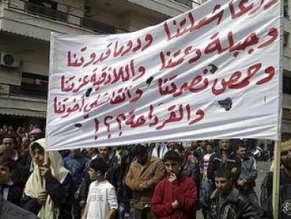|
World Jewish News

Syrian anti-government protesters carry banner in Arabic that reads ''Daraa is our torch, Douma is our model.''
|
Syrian security forces kill 35 in Daraa, cutting water, electricity and telecommunications
27.04.2011, Israel and the World Syrian security forces have killed at least 35 civilians since they began attacking the city of Daraa at dawn on Monday to crush an uprising, Syrian rights organization Sawasiah said on Tuesday.
The organization, founded by jailed human rights lawyer Mohannad al-Hassani, said electricity, water and telecommunications remained cut in Deraa for the second day, with supplies of baby milk and blood at hospitals starting to run low.
This intensification in clashes in Daraa took place as more than 2,000 Syrian security police deployed in the Damascus suburb of Duma on Tuesday, manning road blocks and checking the identity of residents, a witness told Reuters.
The witness said he saw several dark green trucks in the streets equipped with heavy machineguns.
He said men who he believed were members of the plain clothes secret police were carrying assault rifles.
Bus loads of soldiers in full combat gear also crossed the main gate of Duma and began deploying in the suburb, he said.
European governments urged Syria on Tuesday to end violence after President Bashar al-Assad sent tanks to crush a revolt against his 11-year rule in the city of Deraa.
A European Union diplomat said on Tuesday that the EU is discussing possible sanctions against Syria's leadership over its crackdown on protesters.
These would be discussed further at a meeting of ambassadors from EU member states in Brussels on Friday, the diplomat said.
"We are exploring possibilities of further action. The next step will be taken at a meeting on Friday," the diplomat, speaking on condition of anonymity, said.
Any sanctions are likely to begin with asset freezes and travel bans targeting the Syrian leadership, a separate EU source said. It could be up to two weeks before the measures formally pass into law.
British Foreign Secretary William Hague said earlier that London would work with other countries to push for sanctions on Syria's leadership if the government continued to use violence to quell protests.
"Syria is now at a fork in the road .... it can choose ever more violent repression which can only ever bring short term security for the authorities there," Hague told Britain's parliament.
"If it does so, we will work with our European partners and others to take measures including sanctions that will have an impact on the regime," he added.
Syrian security forces have shot dead at least 400 civilians in their campaign to crush month-long pro-democracy protests, Syrian human rights organization Sawasiah said on Tuesday.
The United States is considering sanctions against Syrian government officials to increase pressure on President Bashar al-Assad to end the crackdown.
Britain, France, Germany and Portugal are asking the UN Security Council to condemn the Syrian crackdown in a draft statement being circulated in New York, a UN diplomat said.
Hague said obtaining a full-scale United Nations resolution condemning Syria's actions was difficult for now, although he said that may change if the crackdown continued.
Haaretz.com
|
|
